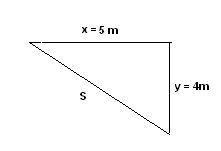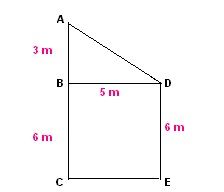Displacement Formula
Displacement is calculated as the shortest distance between starting and final point which prefers straight-line path over curved paths.
Suppose a body is moving in two different directions x and y then Resultant Displacement will be
It gives the shortcut paths for the given original paths.
Here,
u = Initial velocity
v = final velocity
a = acceleration
t = time taken.
Solved Examples
Problem 1: The path distance from the garden to a school is 5 m west and then 4 m south. A builder wants to build a short distance path for it. Find the displacement length of the shortest path.
Solution:
Given: Distance to the west x = 5 m
Distance to the south y = 4 m.

Displacement is given by
s = 6.403 m.
The builder can build a path for displacement length of 6.7 m.
Question 2:A girl walks from the corridor to the gate she moves 3 m to the north opposite to her house then takes a left turn and walks for 5 m, then she takes right turn and moves for 6 m and reaches the gate. What is the displacement, magnitude, and distance covered by her?
Solution:
Total distance travelled d = 3 m + 5 m + 6 m = 14 m.
A magnitude of the displacement can be obtained by visualizing the walking. The actual path from A to B as 3 m then from B to D as 5 m and finally from D to E as 6 m.

So, the magnitude of the resultant displacement is
From figure AC = AB + BC = 3 m + 6 m = 9 m
BD = CE = 5 m
|S| =√92+52 = 10.29 m.
The direction of Resultant displacement is South East.

No comments:
Post a Comment